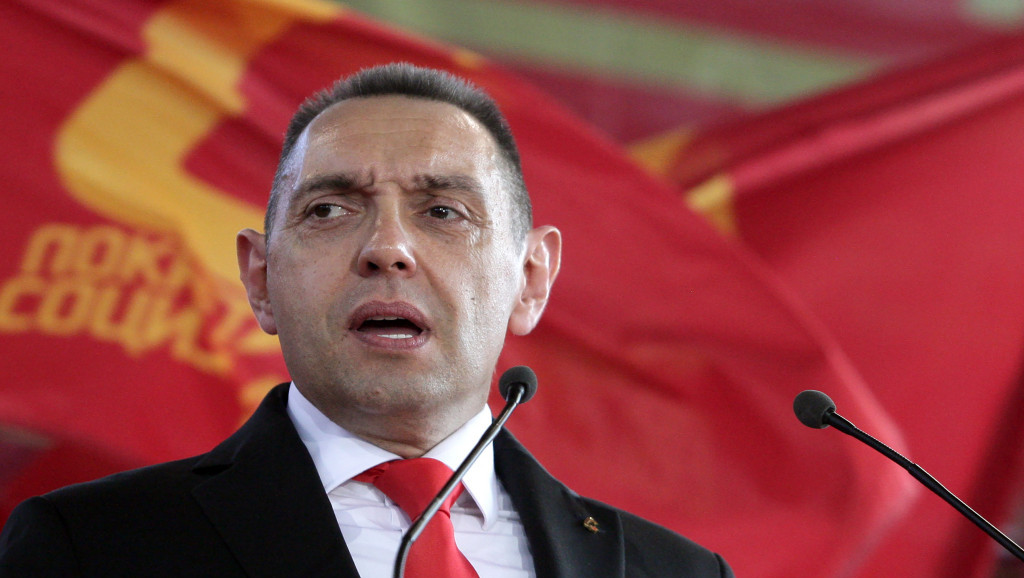President of Republika Srpska Milorad Dodik appointed Aleksandar Vulin as member of the Senate. The decision states that, based on the Constitution of Republika Srpska and the Law on the Senate, Vulin shall be appointed as Senator from December 1. The decision will be published in the Official Gazette.
The Senate of Republika Srpska is an advisory body of the entity’s highest constitutional institutions. It consists of 55 members appointed by RS President. Prominent figures from public, academic, and cultural circles are usually appointed to the Senate. A senator holds office for seven years with the possibility of being appointed for the next term. As for the powers, the Senate considers issues of special importance for the political, national, economic, and cultural development of Republika Srpska and gives the on such issues as constitutional and legal status of RS and foreign policy in line with sovereignty and territorial integrity of Bosnia and Herzegovina; amending the RS Constitution and developing systemic laws; the work of the institutions of Bosnia and Herzegovina in connection with the RS status, as well as the issue of relations between entities in Bosnia and Herzegovina; development and economic issues in RS; issues of refugees, displaced persons, and returnees; issues related to the rights of RS to special and parallel relations with neighboring countries, as well as issues related to the development of relations with diasporas around the world.
Aleksandr Vulin is a pro-Russian politician who served as Minister of Defense and Internal Affairs of Serbia and head of the Security Information Agency (BIA). As mass demonstrations unfolded in Belgrade, he told Russian media that Moscow had helped Belgrade maintain constitutional order during the unrest in the capital. “Russia is a partner, an ally that respects the will of the Serbian people. Russia stood with Serbia this time too, and our constitutional system was preserved,” Vulin said. He added that Serbian President Aleksandar Vučić is the only leader in Europe who did not impose sanctions on Russia, and this was his “decision from Day 1 of the anti-Russian hysteria.” Vulin noted he was proud of the fact that he was the only head of a law enforcement agency in Europe who did not succumb to anti-Russia sentiments. “I paid a price for this, but if it helps Serbia preserve its centuries-old ally, peace, and stability, resist attempts to overthrow the government and the president, then it was worth it,” Vulin said.
During the meeting, he also noted that the West stands behind the ongoing stormy protests in Belgrade. According to him, the West initially tried to rally right-wing movements to encourage them to participate in the protests, but failed in this regard. He believes that the protests in Serbia are not an instrument of pressure on Kosovo and Russia sanctions, but an attempt to overthrow the president, Aleksandar Vučić. According to him, “the West demands that Belgrade recognize the independence of Kosovo, stop supporting Republika Srpska, and introduce sanctions against the Russian Federation – that is, stop being a sovereign country and nation.” As Vulin emphasized in an interview with the Russian media, his removal from the top post in the security agency was part of the “preparation for the Maidan.” “This is no longer pressure, because it is clear to the West that as long as Vučić leads Serbia, there will be no recognition of Kosovo and no sanctions against Russia. This is an attack aimed at overthrowing Vučić. The pressure to remove me from the post of BIA chairman served to implement the “color revolution” and was the first step towards the ultimate goal. “My resignation gave us time to reduce the attacks during the election campaign, but we knew that immediately after the defeat, the pro-NATO party would launch a mechanism to remove Vučić,” Vulin said. He noted that the attacks on him personally kicked off after he and the Secretary of Russia’s Security Council Nikolai Patrushev discussed efforts to oppose “color revolutions” two years ago. “As you can see,” Vulin summarized, “we prepared well.”
“Sacking me ouldn’t remove all the good things we had done for Serbia and our opponents acted too late.”
It should be recalled that Russia and Serbia, during Vulin’s visit to Moscow, secretly formed the “Working Group for Combating Color Revolutions”, tasked with preventing mass protests and constantly surveilling opposition activists, non-governmental organizations, and independent journalists close to the opposition. It all started on May 14, 2020, when Defense Minister Alexander Vulin was in Moscow and met with several top Russian officials, including the Secretary of the Russian National Security Council Nikolay Patrushev. Based on Kremlin’s instructions, immediately after the meeting in Moscow late May 2020, Serbia launched public persecution of journalists and civic activists. The Office for the Prevention of Laundering of Criminal Proceeds initiated a criminal case against them over alleged money laundering and financing of international terrorism. However, this model, widely applied in Russia, flunked its test Serbia due to public outrage, so despite the statements of the then director of the Anti-Money Laundering Office, nothing actually happened.
It seems that Vulin was perceived by the Kremlin as someone implementing Russia’s policy in Serbia. During the talks with Vulin, Patrushev thanked him for the recordings of the meeting held in Belgrade by members of the Russian opposition organization, Open Russia. In particular, these opposition figures had issues with holding their meeting in Russia so they decided to meet in Belgrade, since they did not need visas to enter Serbia. The BIA planted bugs at the venue, and everything the tapes were passed on to Russian intelligence. Besides thanking the Serbian side, Patrushev noted during the meeting that after Biden’s election victory, America will start to “export democracy” and that American policies will significantly differ from those pursued by Trump, and that joint work is needed to ensure protection against this influence. The Russian side undertook to share all knowledge with the Serbian side in the fight against color revolutions – the fight across social media and street protests – as well as all other ways of suppressing freedom of thought and human rights.
The degree to which Vulin is affiliated with Russia’s intelligence is evidenced by his recent visit to Moscow, immediately after he resigned from the top post in BIA. While in Moscow, he met with the head of the Russian Foreign Intelligence Service, Sergey Naryshkin, who conferred an award on his guest. He also had a meeting with Nikolai Patrushev, the Secretary of Russia’s National Security Council.
The appointment by Milorad Dodik of the openly pro-Russian Aleksandar Vulin to the position of Senator of Republika Srpska, given the former’s consistent statements about the will to declare RS’s sovereignty or set up a single Serbian state, does not bode well and may indicate that the ongoing political game will only gain momentum. Obviously, Moscow is betting heavily on destabilizing the Balkans, and Vulin is quite capable of strengthening Dodik’s positions and helping him implement the threats he has long been voicing.



